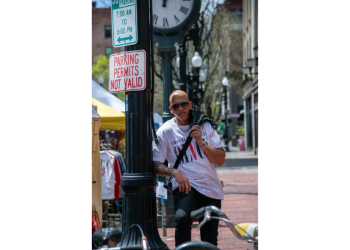Trump’s opposition follows Biden’s statement on Friday praising the deal and pledging to use its new authorities to “shut down the border when it becomes overwhelmed” — a striking shift as he signaled openness to asylum restrictions and other enforcement measures that were previously unacceptable to Democrats.
“If given that authority, I would use it the day I sign the bill into law,” Biden said.
The increase in apprehensions at the southwest border has become a top-level policy challenge for the Biden administration and a core theme of Trump’s bid for a rematch this November. Biden’s management of the southern border and immigration is his worst-rated issue in polls, while survey respondents say they trust Trump more on the issue.
Trump said he opposed the bill because the presidential powers were unnecessary, echoing the position of House Speaker Mike Johnson (R-La.), who on Saturday called the proposal “dead on arrival” in his chamber. “If Joe Biden truly wanted to secure the border, he doesn’t really need a bill,” Trump said in the Las Vegas speech. “I did it without a bill.”
But Trump has also acknowledged political motivations in seeking to block the bill to deny Biden another bipartisan legislative accomplishment.
“A Border Deal now would be another Gift to the Radical Left Democrats,” Trump said in a statement on Thursday. “They need it politically.”
Measures under discussion include an expansion of the government’s deportation powers and an ability to deny migrants access to the asylum system when the number of daily crossings surpasses 5,000.
Illegal crossings on the U.S.-Mexico border were recorded at about 250,000 last month, the highest monthly total ever, and administration officials said the majority of the migrants were released into the country with pending claims for protection. New York, Chicago, Denver and other cities are pleading for more federal aid to shelter and assist the newcomers, including the thousands of migrants sent by Texas Gov. Greg Abbott, a Republican.
Trump on Saturday threw his support behind Abbott for declaring an “invasion.” On Thursday, he encouraged other states to send National Guard troops to Texas. During his Saturday speech, he said as president he would “deploy all necessary military and law enforcement resources.”
He also repeated a campaign promise to launch “the largest domestic deportation operation in American history.”
Trump has steadily escalated his use of inflammatory and dehumanizing language to describe immigrants, accusing them of “poisoning the blood of our country,” drawing condemnation from civil rights and anti-hate groups.
On Saturday, he repeated his descriptions of the migration wave as an “invasion” and an “open wound,” and he described Biden’s management as “a crime against our nation” and “an atrocity against our Constitution.”
“Joe will not get away with these crimes,” Trump said. “With your vote, you will be judged and convicted by the American people of this atrocity he’s done.”
The Biden campaign slammed Trump’s remarks as going against the nation’s interests.
“Donald Trump demonstrated tonight he’s campaigning against solutions for the American people, and is actively rooting against America,” campaign spokesman Ammar Moussa said after his speech. “President Biden is the only candidate focused on governing and addressing the issues the American people demand action on.”
Trump has also attacked his sole remaining primary opponent, former U.N. ambassador Nikki Haley, for having opposed his border wall and ban on travel from Muslim-majority countries. A campaign ad that ran in Iowa and New Hampshire media markets included clips of migrants slipping through the steel slats of Trump’s signature border wall, while promising he would build “even more wall.”
Trump has consistently made attacks on immigrants a centerpiece of his campaigns, from labeling Mexicans “rapists” during his 2016 campaign launch to a warning of a migrant “caravan” ahead of the 2018 midterms. Elsewhere in the Las Vegas speech on Saturday, Trump recounted how he missed having immigration as a top issue when he ran for reelection in 2020.
“I didn’t have the border to run on because I did such a good job with the border that the border wasn’t an issue,” he said. “I went backstage to all of my people and said, ‘I want to talk about the border.’ ‘Sir, nobody cares about the border. You solved the problem.’”
























